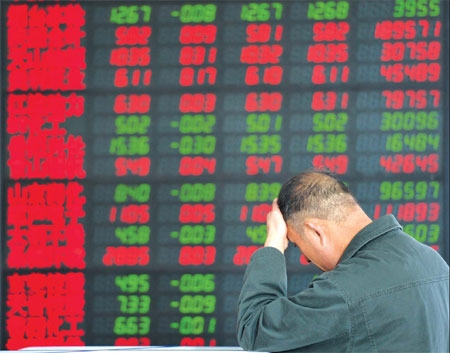A shift in the PE paradigm
Updated: 2011-11-04 10:57
By Hu Haiyan (China Daily European Edition)
|
|||||||||
|
 The sluggish stock markets in China have made the private equity business more difficult. [Provided to China Daily]
|
With returns from IPOs fading, experts say M&As are the new targets
The global market is bleak and Chinese private equity (PE) companies are no longer turning to initial public offerings (IPOs) to make a quick profit. They are no longer pushing companies they have invested millions of yuan in to go public. So what's the new strategy for PE firms? Boost the value of companies to make them more attractive as a merger and acquisition target.
As Kuang Ziping, founder of Qiming Weichuang Venture Capital Management (Shanghai) Co Ltd, says, the golden days for domestic private equity companies in China are long gone.
It wasn't too long ago when investing in a private company and selling its shares after the debut of the company's IPO was the best way for PE firms to reap high returns over a short period of time. China's PE firms saw great returns during the pre-financial-crisis market.
"The price-earnings ratio for the stock market was high domestic companies were more eager to raise funds via PE funds and IPOs," Kuang says.
But the global financial crisis took its toll and left the IPO market in shambles. Several companies failed to price their shares at premium or post substantial gains after their IPOs made their debuts, while other companies withdrew their IPO plans altogether.
The lukewarm market has made the business of IPOs in China more difficult.
According to a recent report by China's leading financial information provider, ChinaVenture Group, the amount of fundraising from PE companies in China totaled $8.04 billion (5.86 billion euros) in the third quarter of this year, with financing on the decline since July.
"Because of the huge profits brought about when companies seeded by PE funds went public, when you asked about the ways of exiting investments, most of the PE companies would give this answer: IPO," says Yan Yan, founding partner of SAIF, a private equity firm that provides capital to companies in Asia.
But the European and US debt crises have severely hampered China's stock markets. The profits are drying up.
"The average price-earnings ratio (for the stock markets) dropped a lot from last year. As a result, some domestic companies are unwilling to proceed with their IPOs, which has blocked the PE companies' way of profiting from their investments," Yan says.
The overseas stock markets are also hurting the domestic PE markets.
"Take the US stock market, for instance. Because of the downturn in the US stock market and because China concept stocks have been sold short by overseas sellers recently, it is not possible for Chinese companies to launch any IPOs in the US right now. This is bringing more difficulties to a successful exit for PE companies," says Byron Roth, president of Roth Capital Partners, a US-based investment banking firm.
Data by ChinaVenture Group revealed that 71 Chinese companies listed overseas so far this year. They raised a little more than $14 billion this year, just 27.62 percent of funds raised by this time last year.
The sluggish fundraising has obviously been tough for PE firms.
"In the past, because of the unreasonably high price-earnings ratio, in most cases, PE companies made every effort to make the companies they had invested to go public to earn huge profits. But they also ignored how to add value to the companies, such as improving the organization and management of invested companies," says Chen Jie, CEO of ChinaVenture. "Now, it is advisable for PE companies to get back to their normal track, searching for companies with great potential and improving them through providing suitable management expertise and wait for the market to recover."
Improving the value of companies, meanwhile, will allow companies to have more leverage when they are targets of mergers and acquisitions (M&A).
Yan says PE firms have to seek other ways to reap a profit as the opportunities for IPOs fade.
"If the companies cannot get listed as planned and they still need capital, an M&A is an effective approach to solving this problem. And it is likely that there will be more M&A cases in the future," Chen says.
In addressing prevalent worries that M&As will force companies to lose their brand and controlling powers, Yan says that "one company can just sell a certain portion of its shares through the M&A process, but not necessarily lose controlling power. And since the market is getting more and more fierce, if you are just waiting to get listed when the stock market is recovering, you will fall behind your competitors. Why not take the initiative to find the partners who share the same values to develop together?"
Chen also warns that PE firms should be cautious about financing.
"Unlike before, when the PE market was flush with capital and investors, some partners (of PE firms) this year are afraid of getting less of a return on their investments and they are not willing to expand their investments in PE funds, which makes the economic problems that much bleaker. Actually, the financing situation will become gloomier next year," Chen says. "But, the situation nowadays is normal compared with the seemingly 'booming' market that was full of bubbles. The explosion of bubbles has helped investors and the market become sensible again."
"This is the best of times and the worst of times. There is an ebb and flow and the market is full of ups and downs. In the past, private equity was filled with opportunities and good companies were knocking on the door, but now we should be opportunity hunters to take the initiative in combating the challenges," Kuang says.
The current difficulties have driven most PE firms to be more cautious in selecting what industries to invest in.
Qu Liping, founding partner of private equity firm Milestone Capital, says that consumption-related industries are now the major investment targets.
"China boasts a huge domestic consumption market, and consumption-related industries are growing fast. For instance, as there is a growing number of Chinese elderly people, the industry of caring for the elderly is developing despite the global economy," Qu says.
Hu Zhanghong, president of CCB International (Holdings) Ltd, a wholly owned subsidiary of China Construction Bank Corp, says that because Chinese people attach more and more importance to their health and daily leisure, and because the real estate industry is under new tougher regulations, healthcare and culture will be areas of major investment in the future.
Wang Junfeng, managing director of Legend Capital Ltd, gives his thumbs up to the clean energy sector.
"According to the national policy, clean energy will constitute almost 16 percent of primary energy resources in China. We are quite optimistic that this industry will develop," Wang says.











